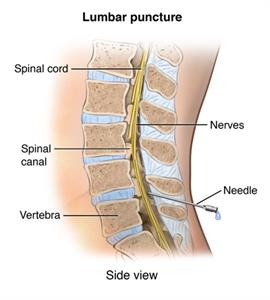Increased Intracranial Pressure (ICP)
What is increased intracranial pressure (ICP)?
A brain injury or some other health problem can cause growing pressure inside your skull. This dangerous condition is called increased intracranial pressure (ICP). It can lead to a headache. It can also further injure your brain or spinal cord.
This kind of headache is an emergency. It requires medical care right away. The sooner you get help, the more likely you are to recover.
What causes increased ICP?
Causes of increased ICP are:
-
Hydrocephalus, which is an abnormal buildup of cerebrospinal fluid. This is the fluid around your brain and spinal cord.
-
Bleeding into the brain
-
Swelling in the brain
-
Aneurysm
-
Blood pooling in some part of the brain
-
Brain or head injury
-
Brain tumor
-
Infections such as encephalitis or meningitis
-
High blood pressure
-
Stroke
-
Idiopathic Intracranial Hypertension

What are the symptoms of increased ICP?
These are the most common symptoms of increased ICP:
These symptoms may look like other health problems. Always see your healthcare provider for a diagnosis.
How is increased ICP diagnosed?

To diagnose increased ICP, your healthcare provider will ask about your past health and do a physical exam. You may also need:
-
A nervous system exam. This is to test your senses, balance, and mental status. Sometimes your healthcare provider can tell if pressure is high by looking into your eye with an ophthalmoscope.
-
Spinal tap (lumbar puncture). This test measures the pressure of cerebrospinal fluid.
-
CT scan. This test makes a series of detailed X-ray images of the head and brain.
-
MRI. This test uses a large magnet and a computer to detect small changes in brain tissue content. It can show more detail than X-rays or a CT scan.
How is increased ICP treated?
Increased ICP is an emergency. Treatment might include:
-
Taking medicine to reduce swelling
-
Draining extra cerebrospinal fluid or blood around the brain
-
Removing part of the skull (craniotomy) to ease swelling (though this is rare)
The medical staff may put a pressure monitor (ICP monitor) through a hole in your skull so they can change the amount of medicine if needed.
You may also be treated for the underlying cause of your increased ICP, such as an infection, high blood pressure, tumor, or stroke.
What are possible complications of increased ICP?
Increased ICP has serious complications, such as:
-
Seizures
-
Stroke
-
Neurological damage
-
Death
Can increased ICP be prevented?
You can lower your risk of certain health problems that may lead to increased ICP, such as:
-
High blood pressure
-
Stroke
-
Infection
-
Head injury
Getting regular exercise, staying at a healthy weight, and eating a healthy diet can lower your risk for high blood pressure and stroke. If you're an older adult or have balance problems, taking a fall prevention course can reduce your risk for falls and injuries. Getting recommended vaccines and washing your hands frequently can lower your risk for infections. You can lower your risk for a head injury by always wearing a helmet when participating in contact sports or riding a bike or motorcycle. Also always wear a seatbelt.
When should I call my healthcare provider?
Call your healthcare provider or 911 if you think you may be having symptoms of increased ICP, such as:
-
Severe headache
-
Blurred vision
-
Feeling less alert than usual
-
Vomiting
-
Changes in your behavior
-
Weakness or problems with moving or talking
-
Lack of energy or sleepiness
-
Seizure
Key points about increased ICP
-
Increased ICP is a dangerous condition.
-
It is an emergency. It requires medical care right away.
-
Increased ICP can result from bleeding in the brain, a tumor, stroke, aneurysm, high blood pressure, or brain infection.
-
Treatment focuses on lowering increased intracranial pressure around the brain.
-
Using seat belts, wearing protective sports gear, getting regular exercise, staying at a healthy weight, and eating a healthy diet can help prevent head injuries and increased ICP.
-
Increased ICP has serious complications, including long-term (permanent) brain damage and death.
Next steps
Tips to help you get the most from a visit to your healthcare provider:
-
Know the reason for your visit and what you want to happen.
-
Before your visit, write down questions you want answered.
-
Bring someone with you to help you ask questions and remember what your provider tells you.
-
At the visit, write down the name of a new diagnosis and any new medicines, treatments, or tests. Also write down any new instructions your provider gives you.
-
Know why a new medicine or treatment is prescribed and how it will help you. Also know what the side effects are.
-
Ask if your condition can be treated in other ways.
-
Know why a test or procedure is recommended and what the results could mean.
-
Know what to expect if you do not take the medicine or have the test or procedure.
-
If you have a follow-up appointment, write down the date, time, and purpose for that visit.
-
Know how you can contact your provider if you have questions.
Online Medical Reviewer:
Joseph Campellone MD
Online Medical Reviewer:
Michelle Anderson DNP
Date Last Reviewed:
9/1/2025
© 2000-2025 The StayWell Company, LLC. All rights reserved. This information is not intended as a substitute for professional medical care. Always follow your healthcare professional's instructions.